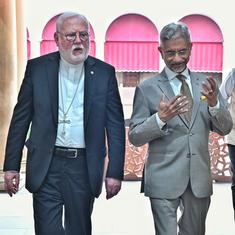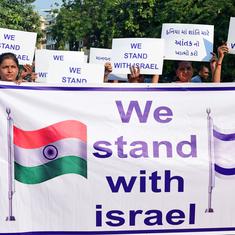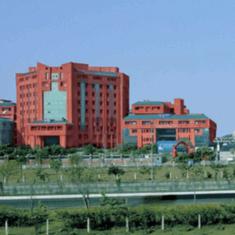The city of Coimbatore, Tamil Nadu’s industrial powerhouse with its thousands of textile units, has been tense since September 22. That night, an unidentified gang of four hacked to death C Sasikumar, a spokesperson of the Hindu Munnani – a Hindutva outfit that emerged in the 1980s in the wake of a mass conversion to Islam in Meenakshipuram village of the state’s Tirunelveli district.
Details of the murder, and the motive behind it, remain sketchy. The police have only said that Sasikumar was involved in the real estate business and could have made enemies as a result of it.
This police version has angered Hindutva organisations and the Bharatiya Janata Party, whose Tamil Nadu president, Tamilisai Soundararajan, rushed back from Kerala – where the party’s national council was meeting – on the night of September 24 to meet the victim’s family. She said Hindu leaders were being targeted and the police were doing nothing to protect them.
During Sasikumar’s funeral procession in the Thudiyalur area the day after his murder, a mob – which included members of various religious groups, according to media reports – went on a rampage. They torched police vehicles and were seen robbing a mobile phone shop in a video that quickly went viral. The police, on their part, deployed close to 2,000 men across the city. Police officials said close to 30 public transport buses were targeted, forcing the state transport corporation to cut down operations.
The violence spilled over into the neighbouring districts of Dindigul and Tirupur. On September 25, the BJP office in Dindigul was stoned.
The murder and the violence came close on the heels of Vinayaga Chaturthi, the only time of the year the Hindu Munnani gets some media attention for its role in organising the immersion event. But it was not an isolated incident. Such clashes between fringe groups owing allegiance to various religions have become common in Coimbatore since 2013.
There also seems to be a pattern to the way these groups reportedly use the killing of their members to fuel communal strife in sensitive parts of the state such as Coimbatore, Vellore and Ramanathapuram – all with substantial Muslim populations.
A history of violence
The root of the communal problem in Coimbatore goes back to the killing of 18 Muslims in riots following the murder of a traffic policeman in 1997. That violence is said to have been the reason behind the Coimbatore bombings by the extremist group Al Ummah a year later, which led to the death of 58 people. These incidents helped the BJP take hold of Coimbatore in the Lok Sabha elections that followed immediately.
In 2013, the Al Ummah emerged again with the high-profile murder of “Auditor” Ramesh, a popular activist of the BJP in Salem who rose through the ranks of the Rashtriya Swayamsevak Sangh. The murder and strong reactions to it from senior BJP leaders such as Venkaiah Naidu prompted the state government to form a special investigation team. This led to the arrest of Fakruddin, Bilal Malik and Panna Ismail, all suspected operatives of the terror group.
The events of the late 1990s also led to the strengthening of fringe elements on both sides in Tamil Nadu. While organisations like the Hindu Munnani and Hindu Makkal Katchi came to be known for campaigns that whip up communal emotions, others like the Tamil Nadu Muslim Munnetra Kazhagam and Tamil Nadu Towheed Jamaat professed a hyper-conservative version of Islam.
All of this resulted in a sort of competitive communalism. The police said even cases that have nothing to do with politics have been leveraged to push this divisive agenda, especially since the arrests in 2013.
Fake communal colour
This was an issue during the investigation into the murder of Ramesh. K Ramanujam, who was then the director general of police, said not every murder of a Hindu activist was communal in nature, but many were being given such a colour. In some cases, the accused and the victim belonged to the same religion.
According to the police, the murder of BJP medical wing secretary Aravinda Reddy in Vellore in 2012 was the result of a feud over a monetary transaction. Pugazhendhi, a BJP activist in Nagapattinam, was murdered the same year over a land deal and had a criminal record.
Some were retaliatory attacks. For instance, the Hindu Munnani's Manjunath was attacked in Udhagamandalam for making derogatory remarks against a minority community.
A senior police officer, speaking on condition of anonymity, said a few of the fringe groups had people with known criminal backgrounds. “We see these outfits primarily use threats to extort and indulge in kangaroo courts,” the officer said.
In a large portion of the cases, the flashpoint was real estate. "When caught, they try to use religion to get away from the clutches of the law,” the officer said, adding that a number of such elements had been arrested over the years.
G Ramakrishnan, Tamil Nadu secretary of the Communist Party of India (Marxist), said anti-social elements had found a haven in such fanatical groups. In the violence in Coimbatore, he said, rogue elements not only looted shops but also attacked places of worship.
"It is important that the state government isolates such groups and takes stern action," he said, while also expressing surprise at how the police had allowed so many people to gather for the funeral procession knowing full well that trouble was brewing.
However, the BJP state chief, Tamilisai Soundararajan, said it was the slack attitude of the police that had led to rising attacks. "They seem to be in denial,” she said. “We want the security of Hindu leaders to be strengthened.”
Soundararajan said Sasikumar had sought police protection but was denied, an allegation the police dismissed as false.
"It is true they have nabbed criminals in some cases. But the pace of investigation is very slow and leads to doubts about the police,” she said.










